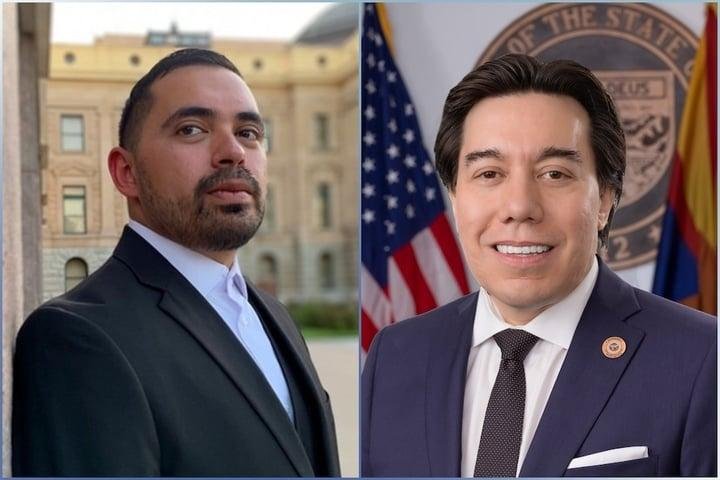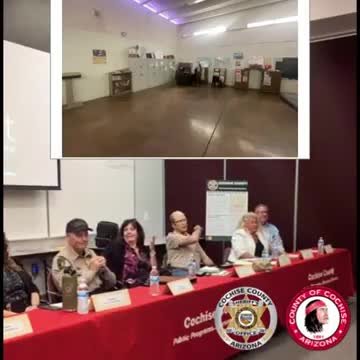State Sen. Brian Fernandez faced off against Democratic primary opponent Jesus Lugo Jr. in a Clean Election debate, but the candidates' positions on policy issues related to education, water, housing and immigration were not significantly different.
Early voting for the July 30th primary election begins this Wednesday, July 3rd.
Fernandez, a Yuma native and tech entrepreneur, is serving his first term as a senator representing southwest Arizona's 23rd Legislative District. Fernandez previously served a half-term in the Arizona House of Representatives, replacing his mother, Charlene Fernandez, who resigned in 2021 to join the Biden administration.
During last Tuesday's debate, he highlighted economic development, education, housing and prison reform as key issues in his reelection campaign.
Lugo, who works as a member of a crisis management team for a Yuma County nonprofit, ran for the LD23 House seat in 2022 but lost to Republican incumbent Peña. Lugo told debate viewers about his work in the community and said he is better suited to represent the district than Fernandez because of his experience working on the ground with vulnerable populations and his extensive experience navigating the immigration system.
“I go out into the community every day and hear the stories and issues that are impacting our community,” Lugo said.
The majority of LD23 voters (47%) live in Yuma County, while another 19% live in Pima County, 34% live in rural and small town Maricopa County, and a small minority live in Pinal County. The district ranges from agricultural to suburban to Tohono O’odham areas, including Mission San Xavier and the community of Sells.
The district leans Democratic, with 34% registered Democrats and 24% Republicans, but the 41% of independents could lean either way, as was demonstrated in 2022 when Republican Michelle Peña won one of the district's two House seats.
The debate was hosted by the Citizens Clean Elections Committee and moderated by Jim Nintzel, government and political impact reporter for the Tucson Sentinel.
Housing Crisis
Fernandez said inflation and rising home prices are currently a top concern for Arizonans, and that deregulating zoning laws could allow local governments to encourage higher-density development and provide more affordable housing options.
He proposed taking advantage of underutilized industrial and office buildings to create more affordable housing, especially after a pandemic-related surge in remote work has reduced demand for commercial space.
Fernandez also supported using low-income housing tax credits to incentivize developers to build more affordable housing.
Lugo agreed that addressing the housing crisis is urgent, and he specifically advocated for affordable housing for low- and moderate-income earners.
He proposed expanding down payment financial assistance programs, lowering mortgage interest rates and creating tax incentives for first-time homebuyers.
He expressed concern that current trends could lead to more high-priced housing.
“We need to continue the housing development efforts we're doing, but we're going to have a lot of housing that people can't afford,” Lugo said.
education
When asked about strategies for funding educational improvements to improve reading and math skills in schools, both candidates emphasized the need for better allocation of tax dollars to the public school system.
Lugo noted that disparities exist between rural and urban areas and stressed the need for equal resources in all districts. He argued that funds diverted to private schools through vouchers were undermining public education. He advocated for greater community involvement in teacher recruitment and retention, and parent involvement to improve reading and math skills.
Fernandez called for fair funding, saying property taxes account for a large portion of school funding and lead to disparities based on local property values, and he criticized the voucher system for diverting money from public schools.
Fernandez cited examples from other states, such as Wisconsin, where early childhood education helps students in their later academic pursuits and said he would push for universal kindergarten and preschool education.
Both candidates touted financial incentives to attract and retain teachers in the state, including higher base salaries and improved benefits.
“If you've ever driven around the state, you'll see big billboards from school districts in Texas offering salaries that are 20 to 25 percent higher than the starting salary in the district they're in,” Fernandez says. “That's hard to compete with.”
Fernandez and Lugo also agreed on the importance of expanding access to higher education through programs such as high school-community college dual enrollment and supported need-based financial aid, with Fernandez emphasizing the need for continued funding and support for existing programs and Lugo stressing the need to better inform students about these opportunities.
Water Management
Lugo stressed the need for communication and cooperation between farmers, businesses and Congress to better conserve water resources and maintain water security, while Fernandez stressed the need for state regulation.
Both candidates said they support Arizona's Groundwater Management Act, which requires developments in the state's densely populated areas to show proof of a 100-year guaranteed water supply before any new homes can be built. Fernandez pointed to problems in so-called “wildcat” subdivisions, such as Maricopa County's Rio Verde Foothills, outside Scottsdale, which struggled to find a reliable water supplier last year.
Fernandez acknowledged the importance of economic development in Arizona, but stressed that it must not come at the expense of water supplies.
“We also need to reexamine our practices when it comes to attracting businesses,” he said. “Arizona has had a great economic development and we want to continue that, but we need to make sure that our water supply is secured and that we can't just put people somewhere and hope that the water will just come out.”
infrastructure
When asked which areas of Arizona's infrastructure need the most investment and how they would prioritize funding for those improvements, Lugo emphasized the need to improve rural roads, while Fernandez said Arizona's expansion and population growth are putting strain on the infrastructure and new solutions for funding are needed.
“It goes back to the revenue problem the state has always had,” Fernandez said. “We have a lot of needs as a growing state, and the previous governor cut taxes every year for eight years. I'm not in favor of high taxes, but at the end of the day, you have to figure out what you need before you cut taxes. The previous governor thought if he kept cutting taxes, that would do the trick, but in the end, it turned out there wasn't enough money.”
Borders and immigration
Asked about efforts to balance humanitarian needs at the border with maintaining a functional border, Fernandez said immigration issues and border security are primarily the responsibility of the federal government and emphasized Arizona's economic and cultural ties to Mexico.
Lugo spoke about his experience living in a border town and working in a migrant shelter to argue for a more inclusive immigration system that is more compassionate to migrants. He particularly criticized the complexity of the asylum process.
“Anyone who's been to the border knows that people are not crossing the border, they are turning themselves in to the Border Patrol and asking for asylum,” he said. “The solution is to get immigration reform done.”
Early voting for the primary begins on July 3, with the winner facing Republican candidate Michelle Arthere in the general election on November 5.







